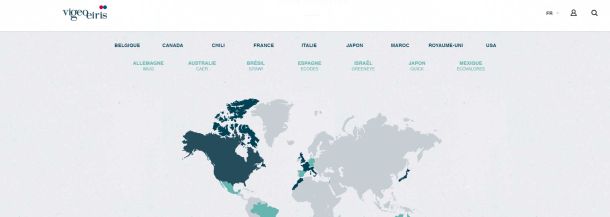UN Global Compact drops Vigeo Eiris case after own goal

The UN business ethics body Global Compact has decided to not go further on the case of controversial French-UK-Moroccan company since the UN body's intervention had leaked to media.
Published 30 May 2017
Above: The French-UK-Moroccan company Vigeo Eiris is a strong supporter of the brutal and illegal Moroccan occupation of Western Sahara. Illustratively, the size of Morocco on Vigeo Eiris's maps is the double of that on UN maps.
The UN Global Compact last week published a short statement on it website (below) in which it announces that it has dropped the role of facilitating a dialogue between French-British company Vigeo Eiris and Western Sahara Resource Watch (WSRW).
Vigeo Eiris is a French-UK-Moroccan company that facilitates energy projects for the Moroccan government in occupied Western Sahara, and which refuses to answers questions from WSRW regarding its role. Read all about the Vigeo Eiris scandal here, including how Vigeo Eiris explains the Moroccan position to the conflict.
Full statement from UN Global Compact, 16 May 2017
On 16 March 2017, the UN Global Compact established a dialogue facilitation process between one of its participants, Vigeo Eiris, and a third party. The UN Global Compact stresses that this process in no way suggests a judgment on the merits of the concerns raised. The UN Global Compact recognizes the value of dialogue as an important tool to foster learning among its participants and provides a medium to facilitate this process. However, the UN Global Compact also expects parties to maintain the confidentiality of the process to foster collaboration and regrets that this has not happened in the present case. At the same time, the UN Global Compact acknowledges Vigeo Eiris’ responses to the third party’s concerns that can be found in the public domain.
For these reasons, the UN Global Compact does not see any further role it can play in this matter.
The statement can also be downloaded here. WSRW asked Vigeo Eiris to elaborate on its participation in the financing of infrastructure in the occupied territory on 23 December 2016, but has not heard from the company since. Responding to civil society's requests is a precondition for being considered an adherent to UN Global Compact. As Vigeo Eiris refuses to answer letters from WSRW, the association asked for help from Global Compact to facilitate the dialogue.
A dialogue facilitation process was opened by UN Global Compact on 16 March. Knowing that a facilitation is confidential, WSRW did not announce the decision to media. However, Global Compact confirmed the opening of the case - to the leading business ethics journal Responsible Investor, which covered the issue on 20 March.
Exactly two months later, the process was stopped due to the leak. Nothing had been stated by the two parties. WSRW was not consulted, and on *1 June 2017 sent a letter to Global Compact asking clarifications regarding how and why the decision was made.
The consequence of the UN Global Compact dropping the dialogue facilitation is that Vigeo Eiris can remain giving an impression of being a credible adherent to the UN Global Compact, yet failing to respond to requests from civil society. The company also violates the rights of the Saharawi people by failing to seek their consent in carrying out certification of Moroccan-Saudi projects on their territory.
*PS: This story was updated on 1 June 2017, 11:30. A previous version of this article, dated 30 May 2017, had stated that Vigeo Eiris also had told Responsible Investor about the opening of facilitation process. That was not correct.
News
Dirty green energy on occupied land
How can it be wrong to develop renewable energy, in a world that is in desperate need for a green transition? In Western Sahara, the problems are numerous.
22 April 2024
EU Court adviser confirms separate and distinct status of Western Sahara
The Advocate General of the EU’s top Court backs the legal status of the people of Western Sahara. Final Judgment expected in a few months.
21 March 2024
EU Court adviser: fruit from Western Sahara should not be labelled as from Morocco
Labelling those products as originating in the Kingdom of Morocco instead of originating in Western Sahara breaches EU law, the Advocate General of the EU Court of Justice concludes.
21 March 2024
COWI abandons future projects in Western Sahara
After undertaking work for the Moroccan state phosphate company in Western Sahara, the Danish consultancy giant COWI states that it “will not engage in further projects" in the occupied territory.
11 March 2024



